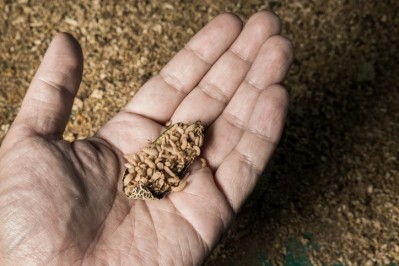Nasekomo looking to bring about an insect led circular economy

It has established a joint venture with French animal genetics experts, Groupe Grimaud, to create FlyGenetics, an alliance dedicated to increasing the performance of the Black Soldier Fly (BSF) as proficient transformers of waste biomass.
The JV will investigate different BSF strains, selecting those more efficient at converting several types of waste streams. “We will also look to shorten the life cycle of the BSF,” Xavier Marcenac, co-founder, Nasekomo, told us.
The Nasekomo team held discussions with Grimaud over 18 months on a potential collaboration. “We carried out some trials, the results of which were positive and led us to establish the JV.”
Marcenac said the partners are looking to go to market with the genetically advanced BSF by the end of next year.
The target would be other insect rearing companies, new market entrants, or waste processors. “It could be anyone with access to good quality organic waste streams and the capital available.”
Long-term circular economy vision
The ultimate idea is to implement a circular economy on a large scale, using a vertical farming system.
“We have spent the last 3 years developing unique solutions for the insect rearing market.
“Our long-term vision is to develop a network of franchise partners that grow the larvae, to whom we will provide a turnkey solution. They would use the genetically enhanced BSF from FlyGenetics as well as our proprietary rearing robotized technology,” said Marcenac.
Those franchise partners could produce larvae only, not processed insect meal, and sell those directly into the poultry production chain or the Sofia-based, Nasekomo, could eventually look to provide centralized processing and marketing services for the larvae that are generated, he said.
Marcenac and his team have spent the past two years robotizing the insect rearing process, and they are now actively involved in getting that technology patented.
Venture capital backing
On top of the €1m it raised at inception, the startup closed a funding round in July this year, whereby it secured €4m. The venture capital funds Morningside Hill and New Vision 3, backed by the Fund of Funds in Bulgaria, participated in the most recent round. They were also joined by several private investors from the UK, France, South Africa and Bulgaria.
Nasekomo said then that investment would support the construction of an industrial facility in Bulgaria. That site could serve as a demonstration facility for its long-term turnkey solution, said Marcenac.
The capital would also support its further deployment of robotics and data analytics, as well as the new selective breeding program.
Nasekomo is also planning to initiate an additional funding round next year, said the co-founder.
Similar projects
UK company, Better Origin, has similar ambitions. This summer saw it launch a miniature farm concept for the poultry sector.
And Singapore based, Protenga, wants to start an insect based farming revolution as well. The company is rethinking insect farming through a technology-driven circular ecosystem approach; it is looking to roll-out a contract farming model. “We are drawing inspiration from the integrated poultry farming or shrimp farming model,” Protenga founder and CEO, Leo Wein, told us in July.
Its decentralized ‘Smart Insect Farm’, which is designed for intake of 20-60 tons of feedstocks daily, is intended to overcome the cost and sustainability pitfalls of centralized mega insect factories.
It is also working with Roslin Technologies to identify new, high-efficiency genetic strains of BSF; that work will be carried out at Roslin’s new genetic nucleus facility in Edinburgh, Scotland.













